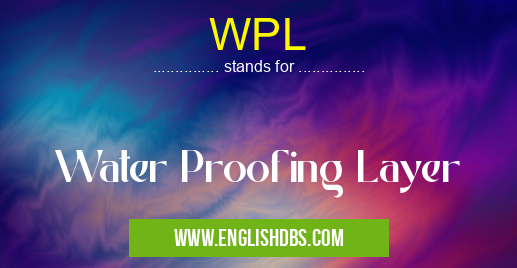What does WPL mean in CONSTRUCTION
WPL stands for Water Proofing Layer. It is a crucial component in various applications, particularly in the construction industry, where it plays a vital role in preventing water seepage and protecting structures from moisture damage.

WPL meaning in Construction in Miscellaneous
WPL mostly used in an acronym Construction in Category Miscellaneous that means Water Proofing Layer
Shorthand: WPL,
Full Form: Water Proofing Layer
For more information of "Water Proofing Layer", see the section below.
What is a Water Proofing Layer?
A WPL is a barrier or coating applied to surfaces such as roofs, walls, and foundations to prevent water penetration. It acts as a protective shield, preventing moisture from seeping into the structure and causing damage to building materials, insulation, and finishes.
Types of Water Proofing Layers
There are various types of WPLs, each suited for specific applications:
- Bituminous Membranes: These are flexible membranes made from modified bitumen or asphalt, providing excellent waterproofing properties.
- Polymeric Membranes: Composed of synthetic polymers, these membranes are highly durable and resistant to UV radiation.
- Liquid-Applied Membranes: These are liquid coatings that cure into a seamless, protective barrier when applied to surfaces.
- Cementitious Coatings: These are cement-based coatings that provide excellent adhesion and waterproofing properties.
Benefits of Using a Water Proofing Layer
Implementing a WPL offers numerous benefits, including:
- Protection from Water Damage: Prevents water penetration, safeguarding structures from moisture-related issues like mold, mildew, and rot.
- Extended Building Lifespan: By protecting building materials from water damage, it extends the lifespan of the structure.
- Improved Insulation: Prevents moisture from reducing the effectiveness of insulation, ensuring optimal thermal performance.
- Healthier Indoor Environment: Prevents moisture from penetrating into living spaces, reducing the risk of respiratory problems associated with mold and mildew.
Essential Questions and Answers on Water Proofing Layer in "MISCELLANEOUS»CONSTRUCTION"
What is a Water Proofing Layer (WPL)?
A Water Proofing Layer (WPL) is a protective barrier installed in structures to prevent water penetration and damage. It consists of specialized materials or coatings applied to surfaces exposed to moisture, such as roofs, basements, and foundations.
What materials are used in WPLs?
WPLs can be made from various materials, including:
- Bituminous sheets or membranes
- Polymeric membranes (EPDM, TPO, PVC)
- Liquid-applied coatings
- Cementitious coatings
- Bentonite clay panels
Where are WPLs typically installed?
WPLs are commonly installed in areas prone to water seepage or damage, such as:
- Roofs
- Basements
- Foundations
- Retaining walls
- Tunnels
- Swimming pools
What are the benefits of using WPLs?
WPLs provide numerous benefits, including:
- Prevention of water damage to structures
- Protection against mold and mildew growth
- Increased durability and longevity of buildings
- Reduced maintenance and repair costs
- Improved energy efficiency by minimizing heat loss through moisture absorption
How are WPLs installed?
WPL installation varies depending on the material and application, but generally involves:
- Surface preparation (cleaning, priming)
- Laying or applying the WPL material
- Sealing joints and seams
- Covering or protecting the WPL
What are common problems associated with WPLs?
Potential problems with WPLs include:
- Punctures or tears in the material
- Improper installation or sealing
- Damage from environmental factors (UV radiation, temperature fluctuations)
- Deterioration over time
How can I maintain my WPL?
Regular maintenance is crucial for the longevity of WPLs. It involves:
- Visual inspections for damage
- Cleaning and removal of debris
- Repairing any punctures or tears
- Recoating or resealing as needed
Final Words: WPLs are essential components for ensuring the longevity and integrity of structures by preventing water penetration and mitigating moisture-related damage. By understanding the types of WPLs available and their benefits, professionals in the construction industry can effectively protect buildings from water damage and enhance their durability.
WPL also stands for: |
|
| All stands for WPL |
